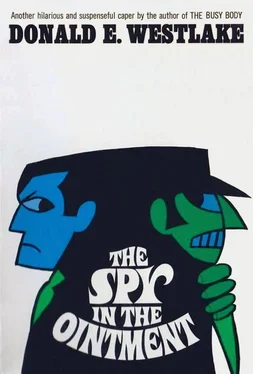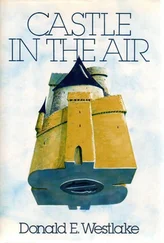“You’ve done fine work, Mr. Zlott,” Ten Eyck assured him, remaining bland and genial. “I’m sure we’re all grateful for what you’ve done.”
Mrs. Bodkin, coming from the kitchen just then with more rolls, said, “Well, of course we are, Eli, you know that.” Zlott seemed somewhat appeased and went back to work on his roast beef after that, though this expression of sympathy for the head of the True Zion Rescue Mission from the president of the Gentile Mothers for Peace left me a little baffled. In any case, dinner continued peacefully from then on, ending with mince pie and vanilla ice cream and coffee, after which we all staggered into the living room to sit down and enjoy the process of digestion.
Jack Armstrong reappeared about eight-thirty, and was promptly taken into a corner by Ten Eyck for a final briefing. I joined them, uninvited but unchallenged, and stood around trying to look like a man who isn’t hearing anything particularly interesting but who has nothing better to do.
“You keep the truck hidden,” Ten Eyck told Armstrong, “until Tuesday. We’ve got the new plates on it, so it should be safe to travel, but I don’t want it parked out on the street for three days.”
“I’ve got the perfect place for it,” said Armstrong eagerly. “One of my member’s fathers—”
“Just so it’s out of sight,” said Ten Eyck. “Now, remember, timing is all-important here. Labotski will be there at two o’clock on the dot, and that’s when you should be there.”
“Right,” said Armstrong. He was nodding and nodding. “I’ll be there,” he said.
“Trucks aren’t permitted on the Drive,” Ten Eyck told him, “so you’ve got to move fast. There’s an entrance just south of the building; you take that onto the northbound side, drive it under the building, stop it in the right lane, and Labotski will pull in directly in front of you. There’s a new switch on the dashboard, you’ll see it, just to the left of the speedometer. You push that to on, and then you’ve got five minutes, so move fast. Out of the truck, into the car with Labotski, and away from there.”
Armstrong had been nodding and nodding all along, but now he held his head still at last and said, “What if the cops come? They’ll haul it away.”
“No. That same switch activates a small charge that’ll break the front axle. They won’t get it out of there in under five minutes. One more thing, don’t try opening the rear doors, we’ve got them rigged. If the police break the lock and open them, the truck blows up right away.”
Armstrong was nodding again. “Okay,” he said. “I got it.”
Ten Eyck clapped him on the shoulder, saying, with just the sort of male heartiness a Jack Armstrong would understand best, “Good man. We’re counting on you.”
I drifted away at that point, passed through the dining room (where Zlott and Mrs. Bodkin had the cards out again and were back into their Russian Bank tourney), and went into the kitchen in search of privacy and more mince pie. While I stood there, leaning against the drainboard, chewing pie and chewing over what I’d learned, Sun came up from the cellar, gave me a conspiratorial wink I failed to understand, and went away toward the living room.
I spent the next minute or two puzzling over that wink, and then was distracted by the sound of a truck engine starting up. I looked out the kitchen window and saw the truck come out of the barn and drive briskly away, Armstrong at the wheel. (It seemed to me he took the bumps in the dirt road a little too briskly, considering his cargo, but I suppose as a man, with an exploding credit card in his hip pocket, I was in no position to cast the first stone.)
It was by now nine o’clock. An air of lethargy had come over the house, as of any headquarters when the planning is done, the die is cast, and the outcome is in the lap of the gods. Simulating the same lethargy as best I could, I licked mince pie from my fingers, determined that I was unobserved, and headed for the stairs.
It seemed to me I finally knew enough to justify dunking my quarter. I didn’t, it is true, know either why or for whom Tyrone Ten Eyck was planning to blow up the UN Building, but at least I now knew when and how. FDR Drive, the high-speed elevated highway which runs north and south along the eastern shore of Manhattan Island (and which is sometimes [by Republicans, I suppose] called East Side Drive), runs under the UN Building. A whole truckload of high explosive detonated under there could very well break the building’s foundation — chop it off at the ankles, as it were — and cause the whole structure to crumble ignominiously into the East River, all at a time when, according to Ten Eyck, it would be more than usually full.
As to that corollary scheme, a depredation of one sort or another which would cause the UN Building to be full on Tuesday afternoon, I still knew absolutely nothing except the outmoded plan to set off a bomb in the U.S. Senate. But whatever it was, it surely had to happen before Tuesday, which meant we were very nearly fresh out of time. I didn’t dare hang around in hopes of finding out what that annex scheme was; the time to call in the Feds was now.
Accordingly, I sauntered casually upstairs, went into the bathroom, filled the toothbrush glass about halfway with water, and carried that into my bedroom.
Ah, but what to do with it now? I couldn’t just leave a glass half full of water, with a quarter at the bottom, sitting in plain sight on the dresser. If someone came in, the sight might strike him as odd. I looked around, opened the closet door, and decided the best place to hide it was up on the shelf, tucked away behind the wide-brimmed fedoras. I got out the quarter — still shiny and new — plunked it in the glass, put it up on the shelf out of sight, shut the closet door, turned away, and the hall door opened.
It was Sun. He stepped quickly inside and shut the door.
I’m sure I must have looked as guilty as a kid hiding a pack of illegitimate cigarettes, but Sun had other things on his mind and didn’t notice. “Come on,” he whispered urgently. “Time for us to get out of here.”
I said, “What? Why? Where we going?”
“Away.” He looked at his watch and his urgency redoubled. “Come on, Raxford,” he said. “ Now .”
There was nothing I could do. Without a backward glance at the closet — within which the shiny quarter was surely by now sending out its useless directional beam — I followed Sun out of the room.
Mrs. Bodkin and Zlott, absorbed in their game, never saw us leave. We went out the front way and down the dirt road to the trees, where we found parked a black Cadillac — new or a repeat I couldn’t say — into which we climbed, to find Ten Eyck at the wheel and Lobo in back. Sun rode in back, I joined Ten Eyck up front.
Ten Eyck, low and curt, said, “Time.”
Sun’s watch must have had a luminous dial. “Five after nine,” he said. “No, about seven after.”
“Three minutes. Good.”
The car moved forward, sliding through the night without lights. The road was vaguely paler than the heavy black of the surrounding trees. Lights shone from the Bodkin house behind us, and small pinpoints of light from the development homes were visible through the trees, but we ourselves moved through a broad groove of blackness in the earth.
Ten Eyck switched the headlights on when we reached the county road. He turned right, and at last I said, “Why the change of plans?”
“No change,” he said casually. “Those little people were of no further use to us.”
From the back seat Sun said, “Did you explain the situation to the other two? Armstrong and Labotski?”
Читать дальше









